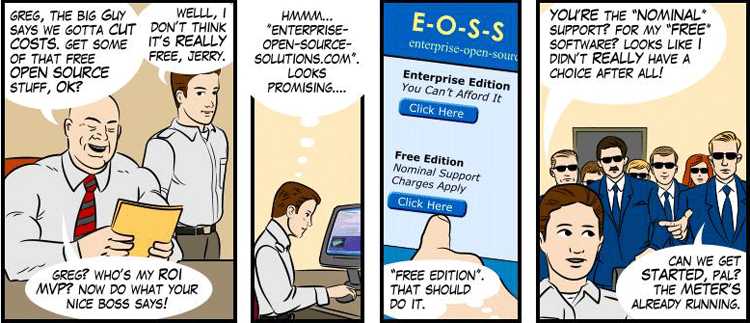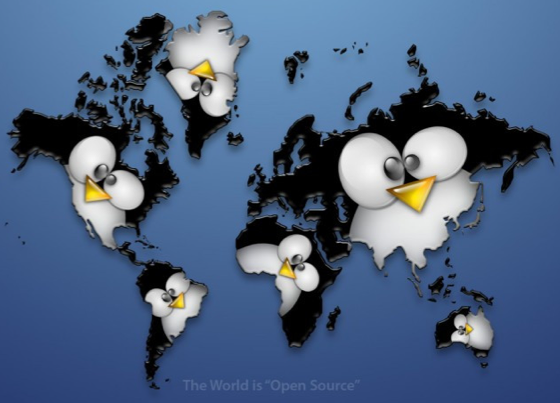
The use of open-source software is growing at an exponential rate, especially by governments and companies who are desperate to reduce cost. During the global financial meltdown in 2008-2009, many organizations or businesses turn to open-source software like the Linux operating system, OpenOffice, Mozilla Thunderbird instead of conventional proprietary software such as Windows OS and Microsoft Office.
However, if too many of them jump onto the bandwagon of “the open source software revolution” rather than purchasing genuine licenses from technology companies such as Microsoft and IBM that provide proprietary solutions, it might cause another worrying issue — business software companies will incur losses, thus resulting in a sizeable dent in the economy.
Comic
Below are four countries that strongly support the open-source community. Their governments have been actively promoting the use open-source software in the government, educational, and defense sector.
1. France
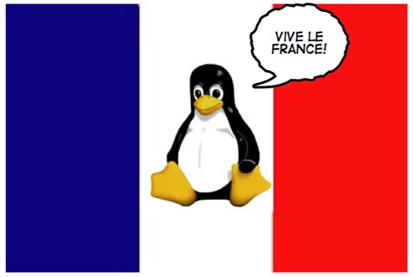
A decade ago, many European countries began experimenting with open-source software, but France has been the only one that is constantly advocating open-source software, especially in the government and educational sector. The French government said in December 2006 that it will “make Paris a centre of excellence for open-source software development” and that “the goal of the centre will be to develop a healthy and profitable open-source software industry”.
Today, France is arguably the most fertile ground for open-source development in the world. The well-known and respected OW2 Consortium foropen-source middleware has its roots there. The country’s open-source software market grew by 33 percent to EUR 1.47 billion in 2009 and is forecast to expand by another 30 percent this year, according to Pierre Audoin Consultants.
A recent report by Ars Technica revealed that France’s Gendarmerie Nationale, the country’s national police force, has saved millions of dollars by migrating its desktop software infrastructure away from Microsoft Windows and replacing it with the Ubuntu Linux distribution.
“Moving from Microsoft XP to Vista would not have brought us many advantages and Microsoft said it would require training of users,” said Gendarmerie Lieutenant-Colonel Xavier Guimard. “Moving from XP to Ubuntu, however, proved very easy. The two biggest differences are the icons and the games. Games are not our priority.”
French parliamentary workstations are equipped with a Linux operating system, with OpenOffice.org productivity software, the Firefox Web browser and an open-source e-mail client. The servers are running Linux, with Apache Web servers and the Mambo content management system.
Open-source software offers functionality adapted to the needs of MPs (members of parliament) and allows us to make substantial savings despite the associated migration and training costs.
In 2008, the French authorities gave out 175,000 thumbdrives loaded with open-source software such as the Firefox 2 Web browser, Thunderbird e-mail client, and OpenOffice.org 2 to Parisian high-school students. With these USB sticks, students are then able to easily access their e-mail, browser bookmarks and other documents on computers at school, home, a friend’s house or in an Internet cafe without paying a bomb. This initiative also helps to reduce piracy since the open-source software that the sticks contain may be freely and legally copied.
2. Norway
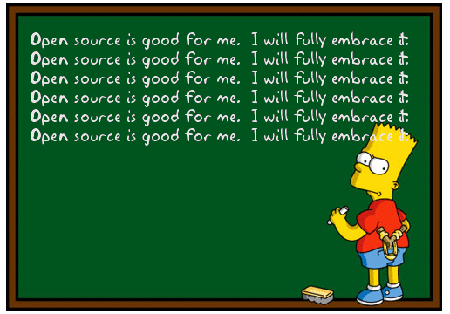
Many big cities in Norway are transferring the operating system to Linux — they have transfered almost all of their servers and more than 50 per cent of desktops to the free open-source operating system. Some of the schools in Norway are using Skolelinux, a complete tailored software solution for the needs of any educational institution or school.
The Norwegian government has also been supporting Linux, including other open-source projects or software too. In November 2008, Minister of Government Adminstration and Reform Heidi Grande Roeys announced a 2 million kroner ($285,000) grant to the national center for free software.
I want to simulate increased competition in the market for office software. OpenOffice is a good alternative to the supplier owned programs in this area. The problem is that the specialized programs and OpenOffice don’t always give optimum performance together. The grant is to solve that.
Instead of general promotion of open-source software, the funds were specifically earmarked for adopting and promoting use of the OpenOffice suite of productivity applications in government offices. Although $285,000 is not a very huge sum of money, but from this we can infer that the Norwegian government is pretty optimistic when it comes to supporting open-source software.
The Norwegian government a year ago also recommended Ogg Vorbis, FLAC and Ogg Theora next to their commercial alternatives MP3 and H.264 as standards for audio and video files.
Norway’s national broadcasting and TV facility Norsk rikkringkasting (NRK) recently announced plans to use ODF as the standard document format and is on the process of moving most of its 4,300 clients over to OpenOffice.
3. Brazil

Brazil is still a developing country, and has a long way to go in the information technology sector. However, the Brazilian government has been actively supporting and embracing open-source software despite the limited funds they have. The rational behind the government’s open-source policy is based on two very closely related factors: economics and development.
For the past few years, Brazil’s government ministries and state-run enterprises are increasingly abandoning Windows in favour of ‘open-source’ or ‘free’ software like Linux. The underlying factor is that paying Microsoft fees was ‘unsustainable economically’ when Linux offers a far cheaper IT solution. Switching to open-source is an attempt to save public funds in a developing country with an indebted government and massive disparities in wealth within the population.
“If you switch to open-source software, you pay less in royalties to foreign companies,” explains Amadeu. “And that can count for a lot in a country like Brazil, which still has a long way to develop in the IT sector.”
Other than reducing costs, Brazilian government’s open-source policy hopes to leverage its impact for development purposes by extending technological tools and knowledge throughout the country using cheaper and easily-accessible open-source applications. By encouraging developer participation and extending computer usage to the poor helps Brazil to foster a skilled workforce –- both in software production and basic IT literacy, thus giving its economy a huge boost.
Organizations too have a policy that provides cheap computers and software to the lower- and middle-income groups so that they need not to depend on business software corporations anymore. All the computers in government of Brazil are using OpenOffice.org for documents processing, and most of the servers are running Linux too. There is also a draft law that forces some organizations to embrace open-source software.
As for the educational sector, the Digital Boards project provides students with a touch-screen digital board measuring 6-1/2 feet wide, and comes with a magnetic pen connected to a computer running Vix Linux. The digital board also comes bundled with hundreds of educational applications for the classes in public schools in Vitória.
4. United States
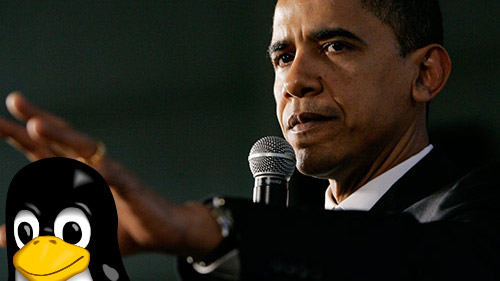
As the leader and forefather of technology, the United States, including the Obama administration and organizations, has been supporting open-source to a certain extent.
It has been widely acclaimed that Barack Obama would not have been elected as the 44th President of the United States without the internet. The Obama campaign harnessed social networking tools like Facebook, Twitter and YouTube to garner support from the young voters. His videos attracted 14.5 million hours of viewing on YouTube, according to Democratic political consultant Joe Trippi. That figure translates to a hefty price tag of $47 million if they were to be aired on TV.
If you were to take a look at the technology behind the Obama and McCain campaign website, you would realized that barackobama.com is running open-source software (LAMP with PHP) while johnmccain.com is running proprietary software (MS Windows and .NET).
As soon as he became the United States President, the Obama Administration announced that they are exploring ways of how the United States government can use open source software rather than rely on proprietary software that is viewed as costing to much money.
The government ought to mandate open source products based on open source reference implementations to improve security, get higher quality software, lower costs, higher reliability — all the benefits that come with open software.
This is a piece of good news for open-source advocates. However, companies like Microsoft, Oracle and IBM will suffer a huge blow if the United States government were to venture into open-source technology aggressively. It is estimated that companies producing proprietary software will incur a massive loss of $400 billion a year. This will affect United States’ economy and unemployment rate adversely when technology companies begin shedding their workforce due to the escalating use of open-source software.
 While the Obama administration is looking into ways to minimize the impact suffered by U.S technology companies, open-source software is already broadly used by many different branches of the government. One quintessential example would be The Department of Defense (DoD), which has been exploring the benefits of open source software for years, has used Linux and open source technology in a wide range of key projects, including the Army Future Combat Systems program and the Land Warrior program. The DoD in February 2009 launched open-source site Forge.mil, a software project management site that will host the military’s public open source software projects.
While the Obama administration is looking into ways to minimize the impact suffered by U.S technology companies, open-source software is already broadly used by many different branches of the government. One quintessential example would be The Department of Defense (DoD), which has been exploring the benefits of open source software for years, has used Linux and open source technology in a wide range of key projects, including the Army Future Combat Systems program and the Land Warrior program. The DoD in February 2009 launched open-source site Forge.mil, a software project management site that will host the military’s public open source software projects.
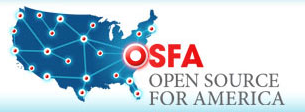 A group of companies and organizations, including AMD, Google and Oracle, has set up a website called Open Source for America. Its main aim is to raise awareness in the U.S. Federal Government about the benefits of open source software. The open-source initiative hopes to encourage the Federal agencies to give equal priority to procuring free and open source software in all of their procurement decisions.
A group of companies and organizations, including AMD, Google and Oracle, has set up a website called Open Source for America. Its main aim is to raise awareness in the U.S. Federal Government about the benefits of open source software. The open-source initiative hopes to encourage the Federal agencies to give equal priority to procuring free and open source software in all of their procurement decisions.
During the 2008-2009 global financial meltdown, New York-based open-source software developers could get up to 20 per cent discount in certain taxes. However, the downside is that there is a $200 maximum limit.
In June last year, the New York State Senate launched what it’s calling a cutting-edge program to not only release data, “but help empower citizens and give back to the community”. The data and technological developments generated by the Senate are placed in the public domain. The New York Senate also created a developer API to help organizations and individuals compile the Senate data they want the way they want. The main objective was to parse the flat file records from the Legislative Retrieval System (LRS) into an open format.
Conclusion
What I have listed above are the four countries that back open-source aggressively. From the examples, we can see that three of them are actually developed and first world countries. They should have deep pockets to tap into proprietary solutions, but they still turn to open-source instead. I personally think that open-source represents a special attitude, and even one of the world’s richest man Bill Gates supports it too.
Although these countries above are looking at open-source seriously, there are still some countries that cannot accept open-source. One possible reason I could think of is that governments of developing countries have limited funds to invest on open source technology, and the level of technology there are pretty low compared to Norway, France and the United States.
In China, not many people are using Linux, and even Mac is not popular too. Cracked Windows OS is installed in many Chinese’ desktops. I can tell you that the copyright problems in China are way beyond words can describe. To most of our dismay, some departments of the Chinese government, companies and organizations are using cracked Windows OS too, and the local authorities are not really stringent enough. As a result, they need not to make a switch to open source operating systems like Linux because what they have is already free of charge.
